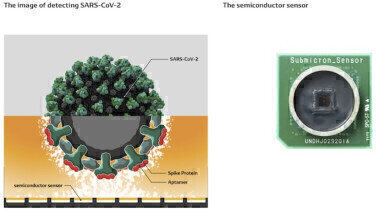-
 The universities and Denso have developed a biosensor to diagnose infectious SARS-CoV-2. © 2021 JCN Newswire
The universities and Denso have developed a biosensor to diagnose infectious SARS-CoV-2. © 2021 JCN Newswire
News
Collaboration Brings Highly Sensitive Biosensor for SARS-CoV-2 Detection
Nov 17 2021
A collaboration between Tokai University, Toyohashi University of Technology, Chubu University and Denso Corporation have been developing testing equipment to detect SARS-CoV-2 with support from the Japan Agency for Medical Research and Development. The group has succeeded in developing a biosensor based on a new mechanism and detecting SARS-CoV-2. The development will now be accelerated toward practical application to contribute to early diagnosis of infectious diseases, which is a key factor in limiting virus' spread.
It is essential to prevent the spread of viruses by early diagnosis and isolation to prevent the medical system from being overwhelmed due to viral infectious diseases. At present, PCR tests and antigen tests are used for the diagnosis of SARS-CoV-2. However, these tests cannot evaluate ‘virus infectivity’, which indicates the power of the detected virus to infect. There has been growing demand for a high-sensitivity and simple detection method to evaluate viral infectiousness.
The universities and Denso have been developing a biosensor for clinical testing equipment to enable high sensitive and quick quantitative detection of viral infectivity. Unlike PCR tests and antigen tests, the biosensor detects the spike protein on the virus surface, which triggers infection, by using a semiconductor sensor and aptamer. The group has succeeded in developing highly sensitive detection of SARS-CoV-2 with high sensitivity by using this technique for the first time in the world.
The semiconductor sensor can quantitatively measure the viral load by using electrical signals. Thus, it is expected to be used to determine the status of infection and confirm the efficacy of treatment with high accuracy. An aptamer is small in size and binds selectively to various types of protein. It is also easy to design and can be mass-produced quickly, and so the aptamers can be used to detect unknown viruses.
The goal of the development of the biosensor by the universities and Denso is to determine the infectivity of SARS-CoV-2 and offer novel tests which have virus detection sensitivity equivalent to that of PCR tests and which is as simple as antigen tests. The group will enhance the basic technology and accelerate the development toward practical application.
Digital Edition
Lab Asia Dec 2025
December 2025
Chromatography Articles- Cutting-edge sample preparation tools help laboratories to stay ahead of the curveMass Spectrometry & Spectroscopy Articles- Unlocking the complexity of metabolomics: Pushi...
View all digital editions
Events
Jan 21 2026 Tokyo, Japan
Jan 28 2026 Tokyo, Japan
Jan 29 2026 New Delhi, India
Feb 07 2026 Boston, MA, USA
Asia Pharma Expo/Asia Lab Expo
Feb 12 2026 Dhaka, Bangladesh


















